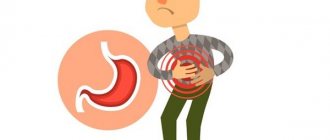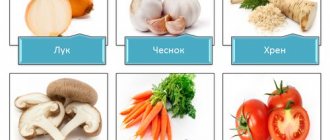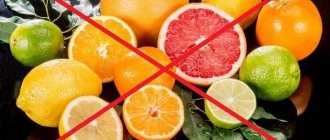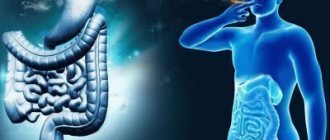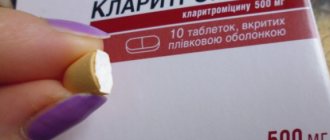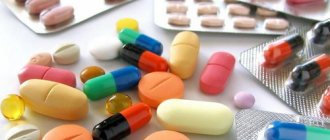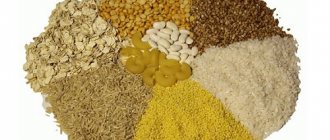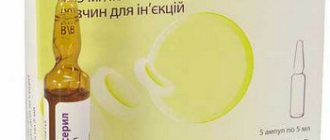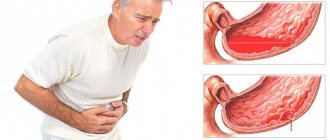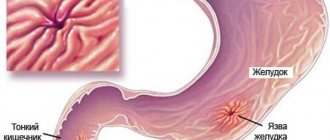Read the article carefully!!!
An attack of gastritis in most cases is accompanied by severe pain, which negatively affects the patient’s well-being and quality of life, deprives him of his ability to work, and in severe cases, even the ability to move.
Proper treatment, diet and compliance with all doctor’s instructions allows you to achieve stable remission, which eliminates the risk of severe pain in the epigastric region. But if the pain is already tormenting a person, it needs to be relieved with the help of special medications.
Let's figure out which painkillers are effective for gastritis, whether they can be replaced with traditional medicine, how exactly different groups of drugs work, and how to choose treatment depending on the level of acidity of gastric juice.
Symptoms of exacerbation of chronic gastritis
The following symptoms are characteristic of an exacerbation:
- constant feeling of heaviness in the stomach;
- burning or pain;
- nausea and vomiting after eating;
- severe heartburn;
- bowel dysfunction (symptoms of diarrhea or constipation);
- unpleasant pungent odor from the mouth;
- weight loss;
- presence of blood in vomit or feces;
- profuse belching;
- decreased appetite;
- increased salivation.
out of 9 tasks completed
Questions:
Information
Take a short test for gastritis:
You have already taken the test before. You can't start it again.
The test is loading...
You must log in or register in order to begin the test.
You must complete the following tests to start this one:
Time is over
Categories
- Unfortunately, you have been diagnosed with many symptoms of Gastritis. You should start treatment immediately.
- You most likely have stomach diseases, but pathology of other digestive organs is also possible. In any case, you need to consult your doctor and undergo additional examinations.
- Congratulations! You have a low chance of gastritis. But still, pay close attention to your symptoms; perhaps the disease is just beginning, and if you at least start eating right, you can prevent the development of the disease.
- With answer
- With a viewing mark
- Task 1 of 9
How regular are your bowel movements? - Task 2 of 9
Do you have breakfast regularly?
- Task 3 of 9
How often do you have a rumbling stomach?
- Task 4 of 9
How often do you have stomach pain?
- Task 5 of 9
Do you notice bad breath?
- Task 6 of 9
In what part of the stomach are you experiencing pain?
- Task 7 of 9
Do you experience heartburn?
- Task 8 of 9
What type of belching do you have?
- Task 9 of 9
Do you often feel nauseous?
The appearance of certain symptoms is individual: for some they occur after eating, for others - on an empty stomach. It is recommended to note the reasons for the deterioration of the condition, which in the future will help the doctor more accurately determine the nature of gastritis and select treatment.
If gastritis of the stomach has worsened, you should seek medical help and undergo examinations for an accurate diagnosis. The doctor will prescribe tests and studies that will help identify the causes and nature of the disease, on the basis of which the correct treatment can be prescribed. An exacerbation of gastritis must be treated immediately, since the disease tends to progress, and in the later stages it is difficult to treat.
To alleviate and relieve acute attacks, painkillers will help, for example, No-Shpa or Drotaverine, which have an enveloping and analgesic effect on the walls of the stomach. If you have problems digesting food, especially fatty foods, you can use Mezim or Pancreatin.
Symptoms of gastritis depend on the form of the disease. An acute attack of gastritis begins suddenly, proceeds violently and does not last long. However, changes in the mucous tissues of the stomach can occur over a long period of time. The mucus on the stomach walls ceases to protect living tissues from the aggressive action of acid, which is necessary for digestion.
Violation of protective functions causes the development of an acute inflammatory process. The main symptoms of an attack of gastritis:
- Pain syndrome of varying intensity.
- Rotten burp.
- Feeling of heaviness in the stomach.
- Bloating, gas formation.
- Heartburn, nausea, vomiting, diarrhea.
- Poor appetite.
- Fast fatiguability.
- Increased body temperature.
Exacerbation of chronic gastritis is accompanied by the following manifestations:
- periodic or constant pain in the upper abdomen;
- belching with an unpleasant odor;
- feeling of nausea after eating;
- painful heartburn;
- vomiting.
In many cases, exacerbation of chronic gastritis is provoked by overeating, consumption of food that is difficult to digest, and abuse of alcoholic beverages. Unpleasant manifestations of gastropathology are felt in the intervals between meals or at night.
The hyperacid form of gastritis is characterized by:
- Increased production of hydrochloric acid by the glands of the gastric mucosa.
- Long-term inflammatory process.
- Pain 2-3 hours after eating and long-term debilitating heartburn.
An attack of gastritis with increased stomach acidity occurs as a reaction to stress or after eating sour and fatty foods and is accompanied by the following symptoms:
- prolonged pain in the solar plexus (after eating);
- diarrhea;
- heartburn;
- nausea;
- flatulence;
- belching;
- feeling of intense thirst;
- excessive salivation;
- metallic taste in the mouth;
- rapid heartbeat;
- headache.
Hydrochloric acid in gastric juice is needed for the breakdown and normal digestion of food. With insufficient acid production, intestinal motility worsens and has a negative effect on the entire digestion process.
Gastritis, which occurs with insufficient production of hydrochloric acid, is characterized by the following manifestations:
- Feeling pain after eating.
- Nausea, rotten belching.
- A bitter taste in the mouth.
- Bad breath.
- Vomiting (if the diet is violated).
- Feeling of tightness and fullness in the abdomen.
- Rumbling in the stomach, flatulence.
- Constipation.
In case of an acute attack of gastritis, you should not wait until the pain subsides on its own. This can take a long time and cause complications later. Gastritis should be treated by a gastroenterologist. However, timely first aid will help alleviate the patient’s condition before the doctor arrives.
Several recommendations for providing emergency care at home during an acute attack of gastritis:
- induce vomiting to empty the stomach;
- in case of severe pain, give the patient an antispasmodic (No-shpa, Drotaverine) or an antacid (Maalox, Rennie);
- Give the patient something to drink: a glass of warm milk;
- chamomile or mint decoction;
- potato juice.
- Rinse the stomach with boiled water, isotonic sodium chloride solution or 0.5-1% sodium bicarbonate solution.
- Do a cleansing enema.
- Prescribe bed rest, limit food intake for 6-8 hours.
- For severe pain, only if there is no doubt about the diagnosis, prescribe dry heat to the abdominal area.
- Administer antispasmodics: 2% solution of no-shpa 0.1 ml per 1 year of life, papaverine hydrochloride orally 0.01-0.05 g per dose, “becarbon”, besalol 1/3 - 1 tablet orally.
- Drink plenty of fluids (Rehydron, Oralit, tsitroglukosolan), a gentle diet.
Most often, an attack of acute gastritis in a patient occurs unexpectedly. Treatment should primarily consist of pain relief. Acute pain is relieved with antispasmodics prescribed by the attending doctor. But what can you advise a patient if the necessary drugs are not available? How to treat an exacerbation that occurs?
You can relieve spasms and feelings of nausea with a piece of ice or a slice of lemon.
Since disruption of nervous regulation processes plays an important role in the exacerbation phase, it is recommended to take drops of motherwort or valerian tincture. Next, calm down and analyze what could have triggered the attack of the disease.
Clinical manifestations of an attack of gastritis:
- Severe sharp or dull pain in the epigastrium.
- The pain is localized in the upper abdomen.
- Nausea and vomiting.
- Belching sour or rotten.
- Bloating.
Clinical signs of acute gastritis are easily recognizable and depend on the duration of the attack. The duration ranges from 2-3 to 7 days; after the acute period is over, it will take a lot of time to fully restore the patient’s health.
Acute gastritis
An attack of acute gastritis resembles an exacerbation of the chronic form. A distinctive feature of exacerbation of chronic gastritis is less severity of pain and duration of the attack.
With increased secretion of gastric juice, attacks of hunger pain sometimes develop. Similar attacks occur three hours after eating. If a patient's gastritis is accompanied by a decrease in secretory activity, clinical manifestations develop immediately after a meal. The duration of the attack reaches several hours.
Usually the pain is sharp cutting or cramping in nature. Vomiting provides temporary relief. Changes in stool in the form of diarrhea are possible. The patient's general condition deteriorates sharply. The temperature rises, chills and malaise appear. If such symptoms appear, consult a doctor immediately.
If the patient has an aggravated chronic form of gastritis, no increase in temperature is observed. Exacerbation of chronic gastritis often begins in autumn or winter. Diet disorders, consumption of unhealthy foods, psycho-emotional stress and heavy physical activity can provoke.
Pain in chronic gastritis appears several hours after the patient eats food. If the attack is severe, the pain develops within half an hour after eating. With the inflammatory process in the duodenum, the pain increases on an empty stomach and decreases after saturation.
Restrictions on taking painkillers
If you experience stomach pain, it is important to understand what caused it, determine its nature, and whether it radiates.
The doctor should always decide how to relieve pain in the stomach. You should not self-medicate, especially if, in addition to pain, the following symptoms are observed:
- nausea and vomiting, especially if there is an admixture of blood in the vomit;
- severe intoxication;
- food poisoning;
- severe dehydration of the body, which is manifested by dry skin, decreased elasticity, and severe thirst;
- disorders of consciousness and drop in blood pressure;
- tension in the anterior abdominal wall;
- development of neurological signs (seizures).
If these symptoms appear, you should immediately seek medical help.
Despite the fact that there are a number of drugs available without a doctor’s prescription that can relieve stomach pain, it is still undesirable to take them on your own, since only a doctor can select an adequate treatment regimen. Also, any medicine has its own contraindications and side effects. In addition, stomach pain can be a symptom of a dangerous disease and only a doctor can identify it. Therefore, when it appears, you should go to the hospital as soon as possible.
Causes of an attack
The disease can be infectious or non-infectious. Usually the causative agent is the microorganism Helicobacter, which settles in the gastric mucosa and causes its destruction. In other cases, the disease may be caused by:
- poor nutrition;
- hot or spicy foods;
- hot, fatty, solid foods;
- binge eating;
- harmful use of alcohol and smoking;
- weakened immune system;
- frequent stress and overwork;
- intoxication (food poisoning);
- helminthic infestation
- frequent hunger strikes or diet for weight loss.
Exacerbations occur against the background of the presence of several pathogenic factors simultaneously, which contributes to the deterioration of the patient’s condition and the occurrence of acute attacks of gastritis.
Expansion of the walls of the esophagus is the cause of distensional pain; it is not intense, manifests itself as pressure or fullness, and is aching or dull in nature. This indicates chronic gastritis.
Frequent causes of an attack of gastritis:
- non-compliance with diet, use of low-quality products;
- chewing food insufficiently;
- smoking and alcohol abuse;
- long-term use of potent drugs;
- hazardous working conditions accompanied by regular contact with chemicals;
- stress, depression.
A significant part of recurrent gastric pathologies is caused by Helicobacter pylori infection. The development of the disease is influenced by internal factors - chronic and inflammatory diseases, anemia.
Pain is a symptom that signals an internal inflammatory process. An attack of gastritis is accompanied by spasms on the left side of the stomach area. The pain can be cramping, intense, weak, or moderate, depending on the severity of the inflammatory process. When the intestinal muscles are damaged, acute spasms are observed, stretching of the outer lining of the esophagus is weak, and with an exacerbation of the chronic form of gastritis, dull spasms are observed, accompanied by heaviness in the stomach.
There are certain causes of pain during inflammation of the mucous membrane:
- non-compliance with the diet: eating low-quality, unhealthy food, eating dry food, snacking, overeating, following strict diets;
- swallowing food in large pieces;
- abuse of alcoholic beverages and tobacco products;
- long course of taking medications;
- exposure to environmental factors;
- stress, emotional turmoil;
- internal diseases: penetration of bacterial infection, disruption of the functioning of the endocrine, cardiovascular systems, pathologies of the abdominal organs.
An attack of gastritis in adults can be triggered by a number of factors:
- incorrect approach to nutrition: non-compliance with the diet, consumption of low-quality products, dry food, overeating, etc.;
- insufficient chewing of food. In order for food to be properly digested, it must be chewed thoroughly. This facilitates the process of digesting food and prevents the possibility of developing diseases;
- long pauses between meals;
- smoking;
- drinking alcohol;
- long-term use of certain medications;
- unfavorable working conditions (contact with chemicals, etc.);
- pathological release of bile into the stomach (reflux);
- damage to the immune defense of gastric epithelial cells;
- failure of metabolic processes in the body;
- prolonged stress and unstable emotional state.
When are tablets needed for stomach pain?
When a person is healthy, eats right, and successfully copes with stress, the work of the gastrointestinal tract (GIT) does not cause him much trouble. But for various reasons, spontaneous disturbances in the motor functions of the stomach occur. A so-called gastrospasm occurs, accompanied by pain.
Medicines to relieve tension are selected depending on the cause of stomach pain, which are divided into 2 groups:
- functional - related to lifestyle, emotional state, environmental situation, often do not even require medication intervention - it is enough to establish a healthy lifestyle;
- organic - caused by irreversible changes in tissues, associated with serious diseases and require long-term, often lifelong treatment.
Medicines for stomach pain are taken if there is confidence that they are caused by reasons that do not pose a threat to health and life:
- if you suspect mild food poisoning;
- with spasms in the pit of the stomach;
- when you feel full after a heavy and fatty meal;
- for heartburn.
If the pain does not go away within several days, do not postpone visiting a gastroenterologist.
How to calm the stomach with gastritis with high acidity
Not only a violation of the diet causes the appearance of gastritis, but also severe stress can provoke its appearance, as well as a pathogenic bacterium - Helicobacter.
Several decades ago it was believed that the cause of the development of gastritis was errors in nutrition. This is partly true. Long periods without food and snacks on the go contribute to the development or exacerbation of gastric diseases, but there are other reasons. It has now been scientifically proven that not only a violation of the diet causes the appearance of gastritis, but also severe stress can provoke its appearance, as well as a pathogenic bacterium - Helicobacter.
This insidious bacterium, once in the stomach, releases toxins that damage its mucous membrane. Since Helicobacter is transmitted through household contact, other family members can also become ill, becoming infected from each other. Therefore, if you are a carrier of the bacteria, you should have personal utensils so as not to infect others.
Symptoms are heaviness in the stomach after eating, a feeling of fullness in the stomach, a dull aching pain immediately after eating, which intensifies in an upright position and when walking, belching, nausea. It is very important to follow a diet. You can eat almost everything, excluding dairy, flour, fresh bread, fatty meat, hot sauces, beans, peas, canned food. But to cook mostly boiled, fried without a rough crust or stewed, mashed dishes.
Second collection: take leaves of coltsfoot, St. John's wort herb and cinquefoil (one part each); two each - knotweed herb, calendula flowers, rose hips; three parts each of crushed chamomile flowers (dry), plantain leaves, mix.
During an exacerbation with swelling of the gastric mucosa:
- take one part each of heather grass and knotweed; two parts each of rose hips and dandelion root; three parts of knotweed herb, mix.
- Pour a tablespoon of the mixture into a thermos, pour half a liter of boiling water for three hours, strain. Drink a quarter of a glass every hour for one or two days, then half a glass three times a day, half an hour before meals and before bed.
To prevent exacerbations in spring and autumn for 2 years, it is useful to take monthly courses: mix three parts of blue cornflower flowers, barberry leaves, dandelion root; four parts thyme herb, five parts Veronica officinalis herb. Art. Pour a spoonful of the mixture into a thermos and pour one and a half cups of boiling water for an hour, strain. Drink half a glass 10-15 minutes before taking the main mixture.
Chronic gastritis with high acidity is considered a pre-ulcerative condition. It must be treated immediately at the first symptoms: pain in the upper abdomen that occurs at night or on an empty stomach and goes away after eating, sour belching, heartburn, and a tendency to constipation. You need to start treatment with a gentle diet: pureed and steamed foods, slimy porridges, various purees.
First collection: mix one part of white willow bark, two parts each of leaves of black currant, birch, viburnum, large plantain, ivy grass; three each of mint leaves and centaury herb; four parts flax seeds; five parts each of motherwort and St. John's wort herb.
Third collection: one part each of tansy flowers and shepherd's purse grass; two each - cumin seeds, flax seeds, chamomile flowers (pharmaceutical or tongueless), licorice root; three parts knotweed grass; four - motherwort herbs; five parts of the herb St. John's wort. Prepare the preparations in the same way as for low acidity, but the infusion should be drunk during the day 20-30 minutes before meals in three to four doses. Course - 21−30 days.
You can alternate the doses: first you drink one, then take a five-six day break and start another. Or choose one of them, taking breaks between doses. An exacerbation of gastritis usually goes away in 3-4 weeks if you strictly follow the treatment regimen.
When should painkillers not be used?
Painkillers should be prescribed by the attending physician, and self-medication is contraindicated. You should also remember that in some cases the doctor may refuse to prescribe pain medications. The fact is that in some disorders, the components of painkillers can cause severe damage to the body, which is very difficult to treat. We list the main disorders for which painkillers should be prescribed with caution:
- Crohn's disease,
- Some intestinal infections
- Megacolon,
- Colitis,
- Tuberculosis,
- Some other rare disorders.
It should also be remembered that severe pain in the stomach area may indicate the presence of not only gastritis, but also other disorders. For example, a person with gastritis may develop inflammation of appendicitis - in this case it will be quite difficult to determine what exactly caused the pain syndrome. If the doctor suspects that the patient has not only gastritis, but also appendicitis, then taking painkillers is contraindicated, and the patient himself should be sent to a surgeon for examination.
Using herbal sedatives for gastritis
It is possible to use ready-made herbal sedatives for gastritis. These include: valerian tablets, Persen, Novopassit and motherwort tincture
First of all, it is recommended to try herbal preparations. In pharmacies you will find many natural sedatives. They usually consist of several types of plants.
To prepare one of them, a composition of equal parts of calendula, oregano and tansy is used. A tablespoon of the mixture is poured into half a liter of boiling water, infused for 10-15 minutes and filtered. The decoction should be taken before meals in the amount of 100 g.
To improve sleep, use a soothing mixture of valerian root, peppermint and trefoil. After chopping and mixing the herbs, a tablespoon of the mixture is brewed with boiling water and infused in a thermos. After 30 minutes, filter the solution and consume 100 grams before bed. This drink for gastritis can be consumed up to three times a week, but only in the evening.
To calm the nerves, drinks made from cumin, chamomile, hawthorn and valerian are recommended. Herbal teas are taken in the morning, throughout the day and in the evening. The treatment course lasts a month and can be repeated periodically.
It is possible to use ready-made herbal sedatives for gastritis. These include: valerian tablets, Persen, Novopassit and motherwort tincture.
In special cases, for gastritis, stronger sedatives are prescribed, which can only be prescribed by the attending physician.
Popular painkillers
For duodenal ulcers, non-steroidal anti-inflammatory drugs are often prescribed. Such medications have a gentle effect and quickly eliminate the resulting spasms. Commonly prescribed ones include the following:
Important: The use of painkillers should be carried out in combination with antibiotics. This will help to get a lasting positive effect. Because therapy consisting of painkillers alone gives only short-term results.
This group of medications relieves spasms. Injections are used for severe pain. In cases where the discomfort is moderate, the use of tablets or other more gentle means is indicated.
Diet will help you get rid of the disease
This is an inflammatory disease that affects the mucous membrane of the walls of the stomach, occurring with a violation of the regenerative abilities of the stomach tissues and their subsequent atrophy. This pathology provokes a violation of the secretory functions of the stomach, as a result of which a person experiences problems with digesting food, as well as pain, burning and other painful symptoms.
First aid is a proper diet, since the food consumed is the main trigger for gastritis. You should avoid the following foods:
- With low acidity (hypoacid gastritis) - fatty, fried, spicy, smoked foods. Soda and alcoholic drinks.
- For high acidity (Acidosis) - fatty soups and broths, hot and spicy foods, canned food, sour vegetables and fruits (apples, citrus fruits, grapes, etc.), fried foods.
At the same time, it is useful to diversify your diet:
- dairy products;
- jelly and compotes;
- porridge (oatmeal, rice, buckwheat, millet);
- boiled poultry;
- fish;
- seafood;
- pasta.
During the diet, you need to eat small portions, but often (at least 5 times a day). Under no circumstances should you overeat or, conversely, experience extreme hunger. Alcohol is completely contraindicated, as is smoking.
Contraindicated medications
It should be noted that if you have a stomach ulcer or gastritis, you should never use the following painkillers:
- Analgin;
- Nise;
- Nimesulide;
- Nimesil.
However, these medications can cause serious side effects, such as perforated stomach ulcers or internal bleeding.
When should you not take painkillers?
If you have certain diseases, using pain relievers is strictly prohibited:
- Crohn's disease;
- perforation (breakthrough) of an ulcer;
- ulcerative colitis;
- presence of E. coli or other infection.
In case of acute persistent pain, do not self-medicate, but urgently call an ambulance!
Pain in the stomach sometimes signals not only gastritis of various etiologies, but also more dangerous ailments. If we are talking about a ruptured ulcer, inflammation of the appendix or peritonitis, then the use of painkillers can harm the diagnosis and worsen the patient’s condition. If you have symptoms of dangerous pathologies, do not select medications yourself; you must immediately call an ambulance.
Drug therapy
Treatment of an attack of gastritis with medications is prescribed by a gastroenterologist individually in each case and depends on the form of the disease and the characteristics of the clinical picture. The main goal of therapy is to eliminate the cause that caused gastritis and restore functions impaired by the pathological process.
| Group of drugs | Title (example) |
| Antibiotics (used for bacterial and viral infections) |
|
| Analgesics (pain relief) | |
| Antispasmodics (relieve muscle spasms) |
|
| Antacids (normalize stomach acidity) |
|
| Gastroprotectors (protect mucous tissues) | |
| Proton pump inhibitors (regulate the production of hydrochloric acid) | |
| Prokinetics (improves gastric motor functions) | |
| Adsorbents (promote the absorption and removal of harmful substances from the gastrointestinal tract: waste, toxins, etc.) |
|
| Antidiarrheal drugs (have a fixing effect, relieve diarrhea) | |
| Enzymes (improves the digestion process) |
|
| Anticholinergics (relieve spasms, normalize gland secretion) |
How to relieve an exacerbation directly depends on the form of the disease.
Along with antibiotics, bismuth preparations with a dual therapeutic effect are prescribed. They have an enveloping effect on the mucous membrane and are at the same time active against Helicobacter pylori infection.
To relieve pain and reduce gastric secretory activity, proton pump inhibitors are prescribed. Omez is considered a common representative of the group. Histamine receptor blockers are less effective in reducing secretory activity. Recently, drugs have been prescribed less frequently.
To create a protective film on the gastric mucosa, the doctor will prescribe drugs from the group of gastroprotectors. These include sucralfate, maalox.
It is possible to relieve pain with the help of antispasmodics - no-shpa, papaverine, spasmalgon, baralgin. During an attack of gastritis, you should not inject non-steroidal anti-inflammatory drugs to reduce pain. These medications have an aggressive effect on the gastric mucosa, worsening the condition. If an attack of gastritis develops, these injections are strictly contraindicated!
Compliance with the diet will be a prerequisite. On the first day of the acute process, it is better to keep the patient on a starvation diet. On days 2-3, fractional gentle nutrition is gradually introduced - porridge, puree, jelly, etc. In the acute period of gastritis, it is better for the patient to keep rest and bed rest.
Antispasmodics
Antispasmodics for gastritis are an indispensable remedy that should always be on hand in case of a sudden attack of pain. They are shown in the form of tablets and intramuscular injections, and the injection acts on average faster than taking the medicine orally.
Antispasmodics are sold without a prescription; you can find them in pharmacies under the following names:
- No-shpa;
- Spasmalgon;
- Spazgan;
- Drotaverine;
- Papaverine;
- Maxigan;
- Tempalgin.
An overdose of these drugs is fraught with neurological disorders and seizures. This can happen if the patient does not receive proper treatment, but simply constantly relieves pain with antispasmodics. Over time, the disease progresses, the pain increases, and the person is forced to take medications constantly.
Antispasmodics have a number of contraindications, including liver and kidney damage, and heart failure.
Diet
During an acute attack of gastritis, eating during the first two days is not recommended. Therapeutic fasting is prescribed, during which it is allowed to drink warm unsweetened tea with lemon and still mineral water. Then liquid boiled dishes are introduced into the menu. It is necessary to exclude spicy, fatty, salty foods from the diet. Food should be warm; too hot or cold food irritates the gastric mucosa.
| Recommended | Excluded |
| Boiled lean meat and fish | Fatty meat, sausage, frankfurters, lard, smoked meats |
| Soft-boiled eggs (2 pieces per day) | Canned meat and fish |
| Dried wheat bread | Rye bread, baked goods |
| Porridge (oatmeal, semolina, buckwheat, rice) | Confectionery, candy, chocolate |
| Boiled vegetables, vegetable puree | Legumes, peas, cabbage, garlic |
| Fresh tomatoes (100 g per day) | Sour and fatty dairy products, sharp and hard cheese |
| Compote and jelly from sweet fruits and berries | Sour fruits and berries |
| Vegetable oil (linseed or sunflower) | Carbonated and alcoholic drinks, coffee |
Eliminates heartburn
With stomach and duodenal ulcers, the patient often suffers from heartburn. To eliminate it, medications belonging to the category of proton inhibitors are prescribed. It is recommended to use such medications to get rid of heartburn and restore damaged mucosal tissue.
Inhibitors work at the cellular level, suppressing the secretory function responsible for the release of hydrochloric acid. At the same time, the products protect the walls of the mucous membrane from acidic action and initiate digestive renewal processes.
Among the widely used blockers are the following:
Important: Use of any drug, even the most harmless at first glance. must be agreed with a gastroenterologist. It is important to understand that an ulcer is a dangerous defect that can be fatal.
This group quickly relieves severe pain that antacids cannot cope with. In addition, blockers act on the root cause that provoked the unpleasant symptoms. These include gastritis, ulcers and esophageal reflux. At the same time, by combining inhibitors with antibiotics, therapy becomes more effective for chronic illnesses.
Folk remedies for treating gastritis
Folk remedies effectively help to quickly stop an acute attack of gastritis:
- Fresh cabbage or potato juice. It is recommended to drink ½ glass 3 times a day. in a day. (1 month).
- An acute attack can be effectively stopped with freshly squeezed red carrot juice.
- You can relieve pain with decoctions of mint, chamomile, anise, St. John's wort, and calendula.
- Motherwort and mint help calm the nervous system.
- Oatmeal jelly or flax seed decoction has an enveloping, softening and analgesic effect. The oats must be soaked overnight, drained in the morning, and the grounds boiled until thickened. Kissel is made from oatmeal.
- Chamomile, St. John's wort, yarrow, celandine successfully relieve pain. 1 tbsp. lie The collection is brewed with a glass of boiling water. Drink warm in small sips. Herbal tea can be consumed when the first symptoms of a gastritis attack appear.
- Sea buckthorn. To prepare the decoction, take 3 tbsp. lie berries, place in a thermos, pour ½ liter of boiling water and leave for 5-6 hours. Sea buckthorn decoction is used as tea.
- Sea buckthorn oil is consumed 1 tbsp. lie in the morning before breakfast (2-3 weeks).
- Dissolve 10–20 drops of 10% propolis tincture in 100 ml of water and drink before meals.
- Ginger, turmeric and thyme have an antibacterial effect. An infusion or tea is prepared from 1 teaspoon. spices and a glass of boiling water.
- Mumiyo is taken before meals in the form of a solution (1 g per glass of warm water).
- When the acidity level is low, drink tea made from fennel, cumin, and chamomile. Blackcurrant juice is very useful.
Traditional medicine offers effective treatments.
- For gastritis with low acidity, wash several green apples and grate them. Take the dish in the morning or at noon. It is better to stop taking the medicine at night. Otherwise, fermentation processes in the stomach will intensify and bloating will begin. It is possible to eat green apples in between main meals. It is useful to drink kefir or yogurt at night. During the first month, this treatment is taken daily. Then the remedy is taken three times a week, starting from the third month - once a week. Fatty milk and meat, spicy and salty foods should be excluded from the diet. Strong tea and coffee, fresh bread and pastries are contraindicated.
- Take a glass of fresh cabbage or potato juice three times a day. You will need to drink it for a month. For prevention, repeat the course after 6 months.
- 2 tablespoons of dried calendula flowers are brewed with 400 ml of boiling water and infused for 15 minutes. The infusion is drunk in small portions throughout the day.
- To relieve an acute attack, you can use fresh carrot juice.
- Decoctions of chamomile, mint, St. John's wort, calendula, and anise have a good analgesic effect.
- To calm your nervous system, try brewing motherwort or mint.
Antibiotics
For chronic stomach pain caused by gastritis, a complex of medications is usually prescribed. In 90% of cases, inflammation and, as a result, pain in the epigastric region is provoked by the microorganism Helicobacter pylori. As a result of its vital activity, toxic substances are produced that disrupt the acidity of the stomach.
If the cause of gastritis is Helicobacter pylori, antibiotics are taken along with painkillers.
For the treatment of Helicobacteriosis, medications based on clarithromycin and amoxicillin are prescribed in combination with one of the proton pump inhibitors (Omeprazole). Antibacterial agents in this case fight the cause of inflammation - pathogenic bacteria. After its destruction, the pain goes away.
Drug treatment
Gastroenterologists prescribe drugs aimed at destroying Helicobacter pylori. In addition to antibiotics, Bismuth is relevant, as it has a combined therapeutic effect: it envelops the mucous membrane and helps fight the source of infection.
To reduce secretory activity and relieve pain, proton pump inhibitors are used, in particular Omez and its analogues. Histamine receptor blockers are used less frequently. Gastroprotectors help form a protective film on the mucous membrane; Maalox and Sucralfate are prescribed for this purpose.
During an attack of gastritis, you can take Maalox
Antispasmodics will be needed to relieve pain: Papaverine, Baralgin, No-shpa, Spazmalgon. Injections with non-steroidal anti-inflammatory drugs are not recommended, as they have an aggressive effect on the protective lining of the gastrointestinal tract.
While taking medications, you must adhere to a fasting diet. On the second day of the attack, you can introduce fractional meals from boiled porridges, jelly, and vegetable broths. Acute therapy involves strict bed rest.
Folk remedies
During an attack of gastritis, accompanied by insufficient secretion of hydrochloric acid, they are treated with green apples: they are grated without the peel and taken in the first half of the day. It is better to avoid them in the evening so as not to provoke bloating and fermentation. The fruit can also be used as a snack between meals.
Take 1 glass of fresh potato or cabbage juice three times a day for a month. After feeling better, the course is repeated approximately six months later as a preventive measure.
Gastritis attack
In case of a sudden attack, calendula tea will help: 2 tbsp. spoons with a heap of dried flowers are poured with 2 cups of boiling water, left to brew for 15-20 minutes. This volume is drunk fractionally throughout the day.
Fresh carrot juice also helps stop a sharp exacerbation. Decoctions of mint, anise, chamomile, and St. John's wort have an excellent analgesic effect. If the cause of the disease is stress, the treatment plan should include recipes that calm the nervous system - tea with motherwort, for example.
Treatment for gastritis at home should be comprehensive and include a special diet and medications. Treatment with folk remedies is allowed, preferably in combination with standard therapy to improve the effect of the drugs. It is not so easy to quickly cure gastritis and ulcers, since you will have to limit your diet and give up many foods that provoke exacerbation.
Medicines
Treatment with medications is aimed at relieving inflammation, eliminating painful symptoms and restoring the mucous membrane, which will restore the lost secretory functions of the stomach. The following drugs are used for this:
- Painkillers (antispasmodics and antacids) - reduce the harmful effects of gastric secretion and eliminate pain (Maalox, Almagel, Phosphalugel, No-Shpa, Drotaverine, Papaverine).
- Anti-inflammatory drugs – reduce the secretion of gastric juice and relieve inflammation (Pantoprozole, Omeprozole, Ranitidine, Omeza, Kvamatel).
- Restorative agents - restore the functions of the stomach and promote better digestion (Mezim, Pancreatin, Reglan, Cerucal, Smecta, etc.).
In each individual case, treatment will be different, since gastritis can be with low or high acidity, so some drugs are aimed at increasing secretion, others at decreasing it. The level of acidity in the stomach is determined by a doctor after special studies (a pH in the range of 1.5 - 2.0 is considered normal), and self-medication “blindly” can lead to a worsening of the condition and exacerbation of the disease.
Traditional medicine helps with gastritis. There are a number of useful and, most importantly, effective methods that will restore normal digestion and relieve painful symptoms. Let's look at a few recipes:
- Potato juice. It is necessary to peel raw potatoes and squeeze the juice out of them. Each time before meals you should drink 100 ml of juice, which will increase the secretion of gastric juice and improve digestion. The course of treatment lasts 1-2 weeks.
- Oatmeal jelly. Take 100 g of oatmeal for 1 glass of cold water and leave to infuse overnight. In the morning, put the infusion on the fire and bring to a boil, adding 1 teaspoon of starch. After cooling, the jelly is ready for use. It is advisable to drink it in the morning before breakfast.
- Honey. It is enough to eat 1 teaspoon of honey every time before meals. This is an excellent anti-inflammatory agent, as well as a source of nutrients that can speed up the recovery time of the mucous membrane after gastritis. It is advisable to be treated with honey in combination with medication therapy.
- The grass is bought. For a glass of boiling water you need to take 1 tablespoon of kupena herb and leave for 30 minutes. After cooling, the infusion is filtered and taken 100 ml 20 minutes before meals. The course of treatment is 1 month. This will help improve digestion, relieve pain and inflammation.
- Elecampane. An effective home remedy is to brew 1 tablespoon of elecampane in a glass of boiling water and leave for 1 hour. The resulting product is taken 3 times a day, half a glass. This method is used for gastritis with low acidity.
Relieving pain is an important component of providing assistance during the period of exacerbation of gastritis. You can relieve spasms yourself by using proven methods of treating the stomach. Effective methods include taking medications and using traditional recipes.
Antacids
Antacids are drugs that contain substances that bind to gastric acids, neutralizing them. Therefore, they are used only for gastritis with increased acidity of gastric secretion.
Antacids are divided into two groups:
- absorbable, which quickly dissolve, which is why their effect is short-lived and there is a risk of “acid rebound”;
- non-absorbable, which do not dissolve in the stomach and therefore today are mainly used to relieve pain in gastritis with a high level of acidity.
Insoluble antacids include:
- tablets: Gastal, Maalox, Tisacid;
- suspensions: Almagel, Maalox;
- gels: Phosphalugel.
The pain relief effect of this group of drugs is based not only on neutralizing acid, but also on reducing spasm of the pylorus of the stomach and increasing the rate of emptying of the organ.
Gastroprotectors and ganglion blockers
For gastrointestinal pathologies, ganglion blockers are rarely prescribed, provided that other drugs have proven ineffective. Gangioblockers block the motor and secretory functions of the stomach. Such an effect can relieve a person of severe pain.
Among the frequently used ganggioblockers, Dimecoline stands out. It has an anesthetic and antispasmodic effect on the vascular system. Due to this, it is prescribed for severe discomfort caused by ulcerative formation.
As for gastroprotective medications. Such medications are indicated for the uncomplicated pathology in question. Venter tablets are considered popular. After their use, the mucous membrane is covered with a layer that protects from the effects of hydrochloric acid and food enzymes.
Phyto pharmacy
Severe discomfort caused by ulcerative formation can be quickly relieved not only by medication, but also by using traditional methods. One of the most effective is considered to be a milk-honey drink, as well as herbal decoctions.
To relieve intestinal pain, you can drink a glass of warm milk with a teaspoon of acacia honey. Drink this liquid 30 minutes before meals. Milk-honey drink reduces gastric acidity and relieves discomfort.
In addition to milk, they also resort to herbal decoctions from plants such as:
- peppermint,
- chamomile,
- St. John's wort,
- elecampane,
- plantain.
A herbal mixture of plantain, elecampane and St. John's wort is especially useful. The raw materials of these herbs are poured with water and simmered over fire. Then, the prepared liquid is allowed to brew and consumed strained.
Regarding the course of treatment, method of preparation and frequency of use, it is better to consult your doctor with such questions. Such decoctions should be used only in consultation with a specialist and should not be self-medicated.
Bactericidal medicines based on bismuth
These analgesic drugs have a pronounced bactericidal effect against microbes that cause ulcer formation. In addition, bismuth preparations can simultaneously relieve pain and relieve inflammation. Bactericidal agents work as follows:
- block further development of Helicobacter bacteria,
- reduce unpleasant symptoms,
- have a positive effect as a gastric analgesic.
Among the most popular are the following:
- Vis-nol,
- De-nol,
- Vikalin.
Bactericidal drugs, entering the intestinal tract, envelop the wound areas. This allows you to relieve inflammation and eliminate discomfort.
